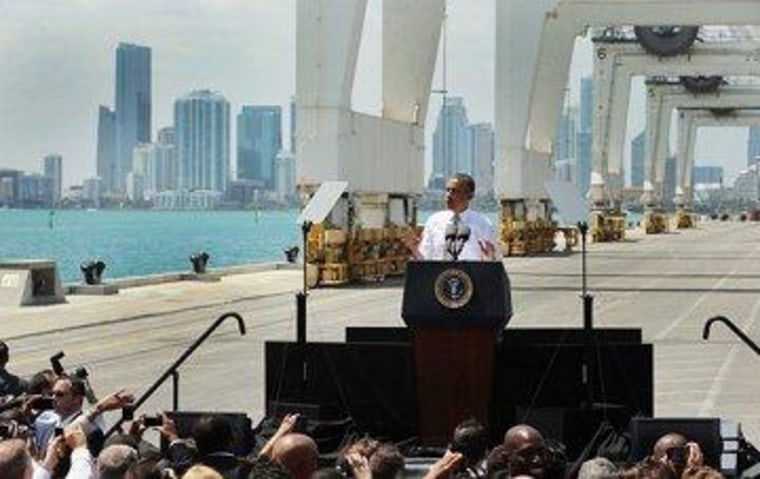We talked briefly on Friday about President Obama speaking in Miami on the need for infrastructure investments, which was encouraging. Indeed, given all the talk about sequestration and debt reduction, any discussion about job growth is welcome.
But over the weekend, I took a closer look at the plan, which the White House calls the "Rebuild America Partnership," and I think it'd be a mistake to just dismiss this as another speech. Congress notwithstanding, Obama's plan is the sort of infrastructure agenda that should, in theory, enjoy broad support.
To be sure, the rhetoric is familiar.
"When you ask companies who brought jobs back to America in the last few years they'll say, if we upgrade our infrastructure, we'll bring even more. So what are we waiting for? There's work to be done; there are workers who are ready to do it. Let's prove to the world there's no better place to do business than right here in the United States of America, and let's get started rebuilding America."
This is true, but it's a message we've heard before. The president explains the economic value of infrastructure investment; Republicans decry public investments and accuse him of wanting to throw money at a problem; and nothing happens -- except maybe the sequester, which makes matters worse, not better.
But what struck me as noteworthy about Obama's infrastructure agenda is that it's not just about throwing money at the problem.
The President is continuing to call for Congress to enact a National Infrastructure Bank capitalized with $10 billion, in order to leverage private and public capital and to invest in a broad range of infrastructure projects of national and regional significance, without earmarks or political influence. [...]The President's new America Fast Forward Bonds program will build upon the successful example of the Build America Bonds program, broadening its use to include the types of projects that can be financed with qualified private activity bonds while also making the combined program more flexible. In addition, the Administration is proposing changes to the Foreign Investment in Real Property Tax Act (FIRPTA) aimed at enhancing the attractiveness of investment in U.S. infrastructure and real estate to a broader universe of private investors.
Frankly, I'd be on board with a plan in which Obama simply said we're going to invest hundreds of billions of dollars in infrastructure, right away, and borrow all of it. The economy needs the boost, borrowing costs are low, and our crumbling infrastructure needs the help.
But the White House's plan is a more moderate approach intended to garner broader support.
The infrastructure bank, which relies on public-private partnerships to finance infrastructure projects, used to enjoy a modicum of bipartisan support, before GOP lawmakers decided otherwise. There's no reason Congress couldn't give this another look.
The second point is of even greater interest. As the New York Times explained, "America Fast Forward Bonds" would "help state and local governments borrow money for projects, while foreign pension and retirement funds would have a tax penalty eliminated so they could invest in infrastructure in the United States on a similar basis as American funds."
It's a serious approach to a serious issue. It was quick ignored, and generated exactly zero discussion on the Sunday shows, but for those who still consider economic investment and job creation an important national issue right now, the president's plan has real merit.
If our politics made more sense, this would not only be a bigger deal, it'd also be the sort of agenda that would generate real discussion on Capitol Hill. That won't happen, of course, but it should.
